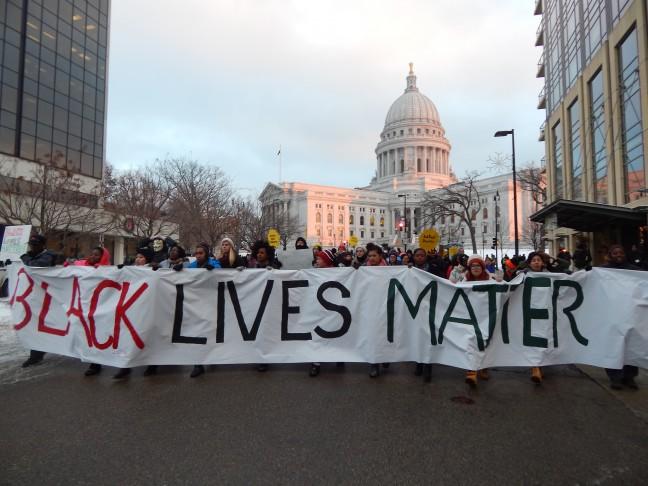More than 250 protesters gathered at the Dane County Jail on Tuesday following the Ferguson grand jury decision, raising awareness about racial disparities while also protesting the county’s plan to build a new jail.
The rally, which began at the jail and went around the Capitol square, was sparked by news that a grand jury in Missouri decided against charging Ferguson, Missouri, police officer Darren Wilson in the shooting death of unarmed black teenager Michael Brown.
Similar rallies occurred in cities across the nation, including Milwaukee, Seattle and Orlando, as well as in cities across the globe, including London and Tokyo.
“Hands up, don’t shoot,” which became a rallying cry after Brown’s death, joined chants of “black lives matter” and “no justice, no peace, no racist police” as the group marched around the state Capitol Tuesday afternoon.
Protesters blocked a downtown intersection during a 4-and-a-half minute moment of silence for Brown, representing the 4-and-a-half hours his body lay uncovered in the street after he was shot.
The rally’s organizers demanded plans for a new county jail be abandoned, instead calling for funding for community-led programs.
Dane County Sheriff Dave Mahoney has said a new jail is necessary in order to provide additional mental health resources and other services.
“My desire is that we create a more humane jail,” he said in August.
At a news conference after the rally, city and community leaders agreed there’s work to be done to address issues of racial disparity in Madison.
Michael Johnson, the CEO of the Boys and Girls Club of Dane County, stressed the importance of hearing the protesters’ voices, as well as the voices of young people.
“As a community, we have to make sure that we continue to invest in the lives of young people,” he said.
Politicians and community leaders need to hear the protestors’ concerns, he said.
One of their concerns regarding the county’s proposal to build a new jail particularly resonated with Johnson, who said it was absurd that, on average, $48,000 per year is spent to incarcerate an individual while only $5,000 is spent annually to educate an individual.
“There’s something fundamentally wrong with that scenario,” Johnson said.
Derek Smith, a member of the Board of Directors at the Urban League of Greater Madison, said it’s important to keep the discussion at the forefront and keep moving forward.
“This is a unique time for us. … The key is what do we do when this is not in the spotlight,” he said.
Focusing on helping people get jobs to increase family stability and instituting programs that will be sustainable for the community will be key going forward, he said.
One program Mayor Paul Soglin has advocated on behalf of is the “Ban the Box” initiative. The initiative makes it illegal for employers to include a question on a job application asking about the applicant’s arrest record.
If an arrest relevant to the position occurred, any investigation into the incident would occur well after the hiring process has begun, allowing a more diverse group of applicants to apply for jobs, Soglin said.
Soglin also stressed he is not a supporter of the county’s proposal to build a new jail, saying the city has other priorities than building the jail.
Working to prevent the homeless from ending up stuck in the court system should be another priority, he said.
“We’ve been working with the courts in trying to get … homeless people out of the trap where they are burdened by all these fines,” Soglin said.
Madison Police Chief Mike Koval recognized no matter what, there’s work to be done.
“The challenge is to think beyond or out of the box in terms of trying some of these new paradigms because obviously the old ones are failing us miserably,” he said.


